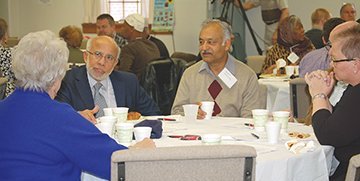By Vicki Brown
Baptists and Muslim discussed understanding, intentionality and service in a dialogue April 20 at Prairie Baptist Church in Prairie Village, Kan.
“In light of recent events in Boston, it is even more urgent that we grow in understanding and respect of one another’s traditions,” Central Baptist Theological Seminary President Molly Marshall said in opening remarks following lunch. “Our gathering today seeks to find common ground and common words — love of God and love of neighbor.”
“Common Ground: A Baptist-Muslim Conversation” was the third event American Baptist Churches USA helped fund in response to an open letter from Muslim leaders in 2007. Conversations have already been held at Virginia Union University and the American Baptist Seminary of the West.
 Roy Medley, general secretary of American Baptist Churches USA said amid fears and mistrust accompanying the April 15 attack on the Boston Marathon, it was encouraging to see Christian and Muslim leaders who are actively involved in peacemaking.
Roy Medley, general secretary of American Baptist Churches USA said amid fears and mistrust accompanying the April 15 attack on the Boston Marathon, it was encouraging to see Christian and Muslim leaders who are actively involved in peacemaking.
“Peacemaking is an essential element of our Christian vocation and the biblical motivation for our many efforts to work for peace with our Muslim neighbors,” Medley said.” We are grateful for the partnership with Central and our other ABC seminaries in this effort. Let us all rededicate ourselves to the often difficult but always essential efforts in local, national and international arenas to wage peace.”
Muslim scholar Nurdeen Lawal called the 2007 Muslim letter A Common Word Between Us and You a “pocket guide” to love God and love neighbors. “The misunderstanding in society today is from those who think they know it all,” he said. “The message must be the love of God.”
The Baptist World Alliance responded in 2009 commending the 138 Muslim leaders and scholars for issuing the Common Word letter, but clarifying the document’s strong affirmation of the “Unity of God” cannot be understood by Baptists as a rejection of the Trinity.
Andy Pratt, vice president for religious ministries at William Jewell College in Liberty, Mo., admitted that his first reaction to the Muslim letter was “Yes, we can do this,” but reading the BWA response made him realize “it wouldn’t be that easy.”
The BWA response to the Muslim leaders’ letter found sufficient common ground in “the way Christians and Muslims speak about love of God and humanity for us to understand each other and open ourselves to mutual exploration. This common ground … is a gift of God to us all.”
“Let’s claim that gift,” Pratt said. “Let’s accept and embrace it.”
Lawal said communication between the two faith communities must flow from “common mutual respect.” Pratt said joining together in communities to address social problems is a way to build understanding and spark discussion of “our faith and how it causes us to respond,” he said.
Pratt called on Christian leaders to “contain our rhetoric” as a means to peace. “When a leader says something [derogatory] about a Muslim, he degrades Christianity,” he said.
The discussion briefly turned to theology when Pratt was asked to share the Baptist understanding of the Trinity. The concept is perplexing to Muslims, Pratt acknowledged, because they believe God is one, but he noted the theology is confusing to Christians, too.
He emphasized that Christians also believe that God is one. He said the Trinity embodies “the loving relationship we have with God” as Creator, Redeemer and Spirit. The Trinity is a way to talk about the mystery of God, he added.
Pratt called for the media to be held accountable when reporting on terrorism. The media usually reports the faith tradition when a Muslim is accused of a crime, but faith is rarely brought up if the person is a Christian. He said the media should report the faith tradition of all or none at all.
Mahnaz Shabbir, president of Shabbir Advisors, said stereotyping still remains a problem for Muslims. In the aftermath of the coordinated terrorist attacks on the United States on Sept. 11, 2001, she said her oldest son, 14 at the time, was active and well-known at his high school, yet two boys called him a terrorist and told him his father was responsible for 9/11.
During a panel presentation Ahmed El-Sherif, a scientist in medicinal chemistry, said growing up along the Suez Canal he “learned about so many countries” and discovered that “the world is very small.”
He said people must learn to co-exist, because “we are very close to one another” and it is “no longer enough to teach our own traditions.”
The conversation ended with a short question-and-answer session. Several participants suggested finding ways to educate followers in both faith traditions and the media.
While expressing appreciation for the event, one attendee wanted to know the percentage of people in the room who favored the implementation of Sharia or Islamic law in the United States. No one responded when called to raise their hands.
“The Quran … says to follow the rule of the land,” Lawal said. “The land we live in is guided by the Constitution…. That is the Sharia.”
